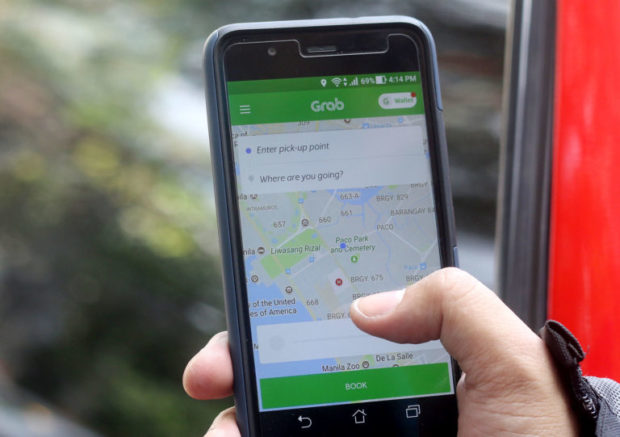
A commuter books a vehicle via ride-hailing app Grab in Manila. INQUIRER FILE PHOTO / RICHARD A. REYES
Users of ride-hailing app Grab should brace for some difficulty in booking a ride this December, when travel demand usually picks up, as the company operating the network failed to secure a permit to add a temporary holiday fleet to augment its supply of vehicles.
This was disclosed by Grab country head Grace Vera-Cruz, who earlier raised the need to increase the number of its partner-drivers by 10,000 to 20,000 this holiday season to address the projected influx of tourists, homebound overseas Filipino workers, and local riders.
She told reporters that the holiday fleet request has yet to be acted upon due to the leadership shake-up at the Land Transportation Franchising and Regulatory Board (LTFRB), which she said might have “disrupted their plans.”
The Department of Transportation (DOTr) just reinstated Teofilo Guadiz III as LTFRB chair through a special order dated Nov. 3 signed by Transportation Secretary Jaime Bautista.
Guadiz was suspended by President Marcos on Oct. 9 following corruption allegations made by his former executive assistant, Jeffrey Tumbado, who later recanted his charges.
Too late to add partners
“We asked for it (holiday fleet). We tried … Up to now, we haven’t received news about it,” she said.
Should Grab be granted its request, Vera-Cruz said it might be too late now as they would need time to survey drivers who are willing to be part of the temporary fleet. Grab and the DOTr had been working on this initiative as early as July.
In a bid to somehow mitigate the lack in supply, Vera-Cruz said the Grab app allows users to book multiple options at a time, increasing chances of securing a ride in the fastest period possible.
At the same time, she noted that ride-sharing is also available, allowing several passengers with different destinations to book the same car for cheaper fares.
Ronald Roda, Grab senior director for strategy and operations, earlier said that passengers usually have three out of 10 chances of successfully booking a ride during the Christmas rush.
Grab’s current capacity of between 20,000 and 30,000 driver-partners is still below the 65,000 it had prior to the pandemic.
Roda said that about two-thirds of their fleet quit from the platform at the height of the COVID-19 lockdown.
Provincial expansion
Since the easing of mobility restrictions due to the pandemic, the app operator has been increasing the number of its driver-partners.
Last October, the company launched its Davao operations with 250 driver-partners, targeting to increase the slots to 1,500 eventually.
Moving forward, Grab is looking at expanding in the provinces as well, including Cebu where it currently has about 10,000 accredited drivers.
But Vera-Cruz said they would need 5,000 to 6,000 more partners to meet the demand in the area, noting that “the tourists have come back to Cebu.” Other target growth areas include Pampanga, Albay, Camarines Sur, and Bacolod.
The app operator is also set to launch the Hotspot Navigation feature this year to enable drivers to identify areas with high demand for ride-hailing bookings in real time. It is likewise designed to improve the earning capability of the company’s driver-partners.
Apart from this, Grab has already rolled out features to make its driver-partners’ tasks easier, including sharing passengers’ live locations to enable quicker pickups and enabling back-to-back bookings to minimize the idle time between rides.
The local ride-hailing market has been dominated by Grab after it bought competitor Uber in 2018.
However, two players—low-cost carrier AirAsia Philippines and California-based ride-hailing company InDrive—are now trying to break into the sector and have requested licenses to operate.
RELATED STORIES
Hundreds of riders protest Grab’s new fare policy
Grab to deploy ‘holiday fleet’